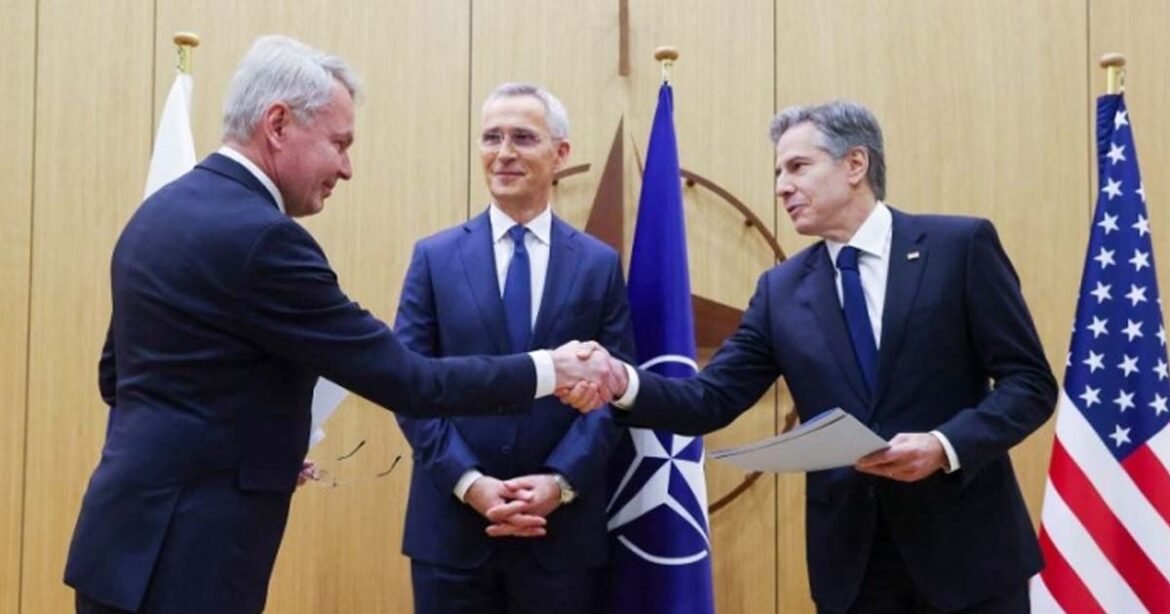Finland will become the 31st member of NATO (North Atlantic Treaty Organization), the world’s largest military alliance this week, prompting Russia to declare that it would increase its defenses in reaction. Finland will officially become member of the world’s biggest military alliance on Tuesday, days after Turkey approved the Nordic country’s membership.
Due to Finland’s 1,300-kilometer (810-mile) border with Russia, the length of NATO’s border with Russia will roughly double, and Moscow has pledged to increase its forces in border regions in response to the move.
The accession of Finland to NATO is one of the most significant events in recent NATO history. On the eve of a summit of the alliance’s foreign ministers, NATO Secretary-General Jens Stoltenberg told reporters in Brussels on Monday, “This is a historic week.” He stated that the measure will make “Finland safer and our alliance stronger.”
“We will raise the Finnish flag for the first time here at NATO headquarters. It will be a good day for Finland’s security, for Nordic security and for NATO as a whole,” Stoltenberg said.

Tough way to NATO, Sweden still on hold
With the Russian invasion of Ukraine last year, Finland and Sweden abandoned their customary attitude of military neutrality out of fear that they might be the next targets. In May of 2022, they filed for NATO membership.
In recent weeks, the parliaments of both Turkey and Hungary confirmed Finland’s application to join NATO, removing the final significant obstacle to the country’s membership. To accept a new nation into NATO, all existing members must vote unanimously in favor.
You can also read: China’s loans to Africa: Why is the World Bank concerned?
Each of the thirty existing members had signed the Finland membership treaties. Turkey had delayed the application, citing Finland’s backing for “terrorists” as the reason. The application from Sweden is still being held up by Turkey. It says that Ankara believes that Stockholm is hiding members of terrorist groups, which Sweden denies, and that Turkey has asked for their extradition as a step towards ratifying Sweden’s membership.
Hungary is also preventing Sweden’s entry, citing frustrations over criticism of Prime Minister Viktor Orbán’s policies. Yet, NATO diplomats expect Budapest to endorse Sweden’s petition if it sees Turkey going in that direction. Stoltenberg expressed his hope that Sweden, which applied for NATO membership at the same time as Finland, will be able to join in the coming months.
Stoltenberg, noted “Sweden will also be safer as a result,” of Finland’s membership. “Sweden is not left alone. Sweden is as close as it can come as a full-fledged member,” he said.
Russia at pressure; What’s next?
Collective defense is one of the basic concepts of NATO, which means that an assault on one-member nation is considered an attack on all.
For Russian President Vladimir Putin, Finland’s entry represents a significant strategic loss. Last year, he deployed his army into Ukraine with the hope that it would impede NATO’s development and damage Western collectivism. In reality, it has had the opposite effect.
Stoltenberg remarked that as a result of Finland’s accession to NATO, the military alliance’s land border with Russia had more than doubled. “President Putin went to war against Ukraine with the clear aim to get less NATO…he is getting the exact opposite, he is getting more NATO presence in the eastern part of the alliance, and he is getting two new members with Finland and Sweden,” he said.
Russia’s reaction
In response to Stoltenberg’s statement, Russia’s Deputy Foreign Minister Alexander Grushko stated,”In the event that the forces and resources of other NATO members are deployed in Finland, we will take additional steps to reliably ensure Russia’s military security.” He didn’t go into further detail.

According to state-run news agency RIA, Alexander Grushko stated that Moscow would increase its military capacity in its western and northwestern territories in response to Finland’s admission.
Finland will become the seventh NATO member on the Baltic Sea, further limiting Russia’s access to the shore at St. Petersburg and its small exclave of Kaliningrad.
The invasion of Ukraine by Russia has had a profound effect on Finnish public opinion. In the spring of last year, the proportion of Finns who support NATO membership increased from a meager one-third to about 80 percent.


